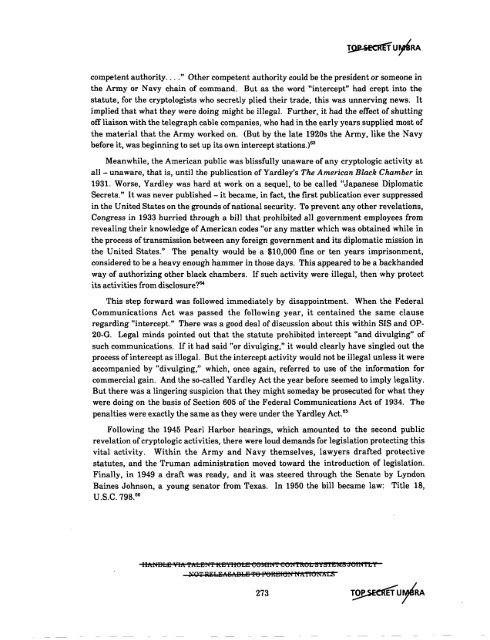American Cryptology during the Cold War - The Black Vault
American Cryptology during the Cold War - The Black Vault
American Cryptology during the Cold War - The Black Vault
Create successful ePaper yourself
Turn your PDF publications into a flip-book with our unique Google optimized e-Paper software.
competent authority...." O<strong>the</strong>r competent authority could be <strong>the</strong> president or someone in<br />
<strong>the</strong> Army or Navy chain of command. But as <strong>the</strong> word "intercept" had crept into <strong>the</strong><br />
statute, for <strong>the</strong> cryptologists who secretly plied <strong>the</strong>ir trade, this was unnerving news. It<br />
implied that what <strong>the</strong>y were doing might be illegal. Fur<strong>the</strong>r, it had <strong>the</strong> effect of shutting<br />
off liaison with <strong>the</strong> telegraph cable companies, who had in <strong>the</strong> early years supplied most of<br />
<strong>the</strong> material that <strong>the</strong> Army worked on. (But by <strong>the</strong> late 1920s <strong>the</strong> Army, like <strong>the</strong> Navy<br />
before it, was beginning to set up its own intercept stations.)63<br />
Meanwhile, <strong>the</strong> <strong>American</strong> public was blissfully unaware of any cryptologic activity at<br />
all - unaware, that is, until <strong>the</strong> publication of Yardley's <strong>The</strong> <strong>American</strong> <strong>Black</strong> Chamber in<br />
1931. Worse, Yardley was hard at work on a sequel, to be called "Japanese Diplomatic<br />
Secrets." It was never published - it became, in fact, <strong>the</strong> first publication ever suppressed<br />
in <strong>the</strong> United States on <strong>the</strong> grounds ofnational security. To prevent any o<strong>the</strong>r revelations,<br />
Congress in 1933 hurried through a bill that prohibited all government employees from<br />
revealing <strong>the</strong>ir knowledge of <strong>American</strong> codes "or any matter which was obtained while in<br />
<strong>the</strong> process of transmission between any foreign government and its diplomatic mission in<br />
<strong>the</strong> United States." <strong>The</strong> penalty would be a $10,000 fine or ten years imprisonment,<br />
considered to be a heavy enough hammer in those days. This appeared to be a backhanded<br />
way of authorizing o<strong>the</strong>r black chambers. If such activity were illegal, <strong>the</strong>n why protect<br />
its activities from disc1osure?64<br />
This step forward was followed immediately by disappointment. When <strong>the</strong> Federal<br />
Communications Act was passed <strong>the</strong> following year, it contained <strong>the</strong> same clause<br />
regarding "intercept." <strong>The</strong>re was a good deal ofdiscussion about this within SIS and OP<br />
20-G. Legal minds pointed out that <strong>the</strong> statute prohibited intercept "and divulging" of<br />
such communications. If it had said "or divulging," it would clearly have singled out <strong>the</strong><br />
process ofintercept as illegal. But <strong>the</strong> intercept activity would not be illegal unless it were<br />
accompanied by "divulging," which, once again, referred to use of <strong>the</strong> information for<br />
commercial gain. And <strong>the</strong> so-called Yardley Act <strong>the</strong> year before seemed to imply legality.<br />
But <strong>the</strong>re was a lingering suspicion that <strong>the</strong>y might someday be prosecuted for what <strong>the</strong>y<br />
were doing on <strong>the</strong> basis of Section 605 of <strong>the</strong> Federal Communications Act of 1934. <strong>The</strong><br />
penalties were exactly <strong>the</strong> same as <strong>the</strong>y were under <strong>the</strong> Yardley Act. 65<br />
Following <strong>the</strong> 1945 Pearl Harbor hearings, which amounted to <strong>the</strong> second public<br />
revelation of cryptologic activities, <strong>the</strong>re were loud demands for legislation protecting this<br />
vital activity. Within <strong>the</strong> Army and Navy <strong>the</strong>mselves, lawyers drafted protective<br />
statutes, and <strong>the</strong> Truman administration moved toward <strong>the</strong> introduction of legislation.<br />
Finally, in 1949 a draft was ready, and it was steered through <strong>the</strong> Senate by Lyndon<br />
Baines Johnson, a young senator from Texas. In 1950 <strong>the</strong> bill became law: Title 18,<br />
U.S.C.798. 66 Ih'tUBLI!1 VIA TALI!1I
















